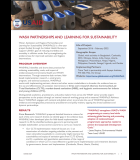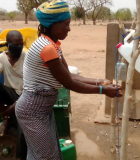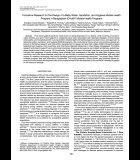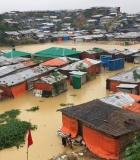SHIKHA
Malnutrition among pregnant women and children less than two years old is a major public health concern in Bangladesh. In order to improve the maternal diet practice and to reduce under-nutrition among children less than two years old, the SHIKHA project has been designed and implemented in the Feed the Future zone of Bangladesh in 26 sub-districts of Barisal and Khulna Divisions. The project designed a multi-faceted program, consisting of home visits, health forums, social mobilization, and a mass-media campaign.
Social and behavior change (SBC) interventions have been applied in the past to improve the diets and nutrition of pregnant women and children less than two years. However, knowledge gaps exist regarding the effectiveness of large-scale SBC programs. This study was designed to evaluate the effect of a large-scale SBC project, the SHIKHA intervention, in order to provide a strategic direction for quality improvement and to document the lessons learned during the project.
Activity Description
The SHIKHA project works to reduce undernutrition among pregnant women and children under the age of 2. The project scales up maternal nutrition and infant and young child feeding interventions in 26 subdistricts in Bangladesh.
SHIKHA is a name inspired by the Bangla term, “shisukekhawano,” which means infant and young child feeding. The project is implemented by FHI 360 and funded by the U.S. Agency for International Development under the Feed the Future initiative. BRAC, another project partner, implements community-level activities.
The project focuses on changing feeding practice behaviors through five core interventions:
- Home visits: Nutrition workers record every pregnancy in the community in a registry and follow up with mothers until their children are 2 years old, for a total of 16 home visits ― four visits during pregnancy and 12 after the child is born.
- Mobilization: Project staff engage fathers of children under 2 and doctors to encourage good infant and young child feeding behavior in the community.
- Health forums: Community meetings, comprised of pregnant women, mothers of children under 2, mothers-in-law and adolescent girls, are held to discuss issues about health and hygiene practices in the community.
- Antenatal and postnatal visits: Pregnant women and lactating mothers receive medical care and counseling from community health workers.
- Mass media and communication campaign: Seven advertisements, which address specific barriers to good infant and young child feeding practices, appear on national television channels. FHI 360 works in partnership with Asiatic Marketing and Communications Limited to design and execute media campaigns in 1,351 villages in project sub-districts that otherwise lack access to media.
SHIKHA engages 4,830 community volunteers, 395 community health workers and 667 nutrition workers through BRAC and trains them in maternal nutrition and infant and young child feeding.





